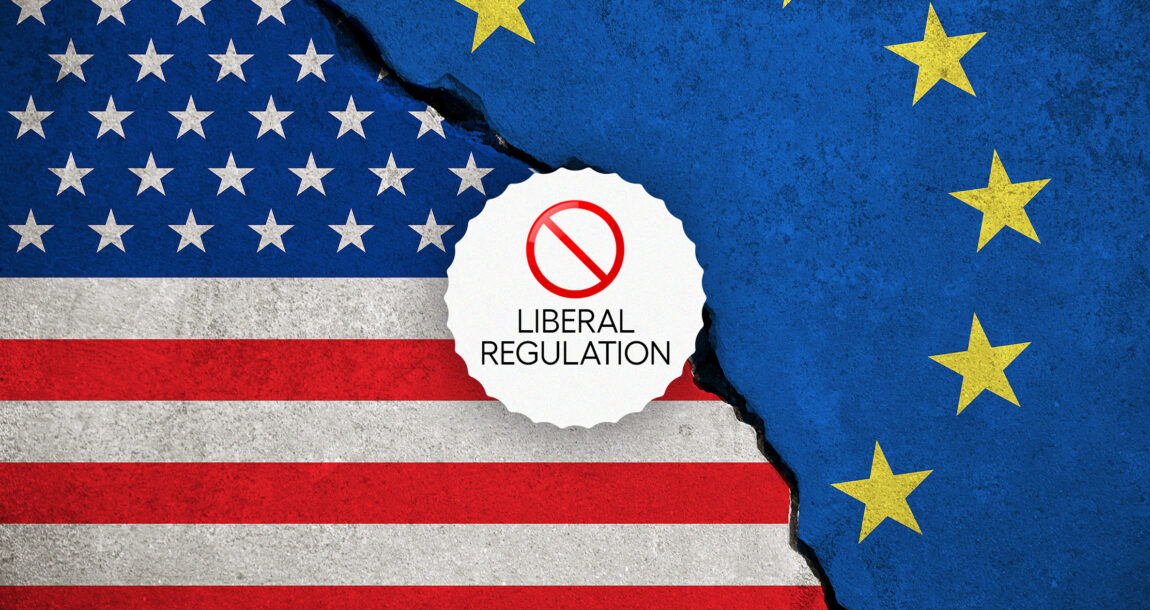Commentary: The US must reject Europe’s liberal insurance regulations

America is ceding its insurance regulation to international nongovernmental organizations that have crippled Europe’s insurance sector. If U.S. regulators continue down this path, they risk implementing liberal, European Union-style policies that stifle growth and weaken the industry’s ability to provide affordable insurance coverage to consumers.

The International Association of Insurance Supervisors’ continual push for the insurance capital standard and the EU’s Solvency II framework, which regulates and sets standards for insurers operating in the EU, serve as cautionary tale. The European insurance sector provides a stark warning of what happens when regulations go unchecked. In 2016, the EU developed Solvency II, a regulatory framework that placed severe restrictions on insurers and limited investment opportunities. The regulation even imposes arbitrary punitive requirements on insurers that have exposure to fossil fuels.
The restrictive and myopic design of the EU’s insurance regulation has severely weakened its securitization market. Insurers are being restricted from investing in the secondary credit market. The market remains anemic and is excessively punitive toward structured products such as collateralized loan obligations and mortgage-backed securities, hindering the EU’s ability to finance economic growth. Unlike the U.S., where securitization plays a critical role in mobilizing capital, Europe has imposed stringent regulations, including high capital charges under Solvency II, that disincentivize investment in these assets. A better alternative would be to match capital with commensurate risk — or equal capital for equal risk.
As a result, European insurers, which could otherwise serve as a major source of funding, hold a mere 0.33% of their investment assets in securitizations, compared to 17% for their U.S. counterparts. The EU’s “due diligence” requirements deter market participation, particularly for smaller financial institutions. Without meaningful reform, Europe’s securitization market will remain frozen, restricting capital flows and deepening its competitive disadvantage relative to the U.S. Allowing insurers more leeway to invest in securitizations, such as asset-backed securities, has been proven to lower the cost of credit for mortgages, credit cards and auto loans.
Recognizing the shortcomings of their failed experiment, Germany is now rolling back some of these stringent regulations to encourage market growth. Ironically, as Europe attempts to reverse course, it is those same European elites who championed Solvency II that are pressuring American regulators to adopt similar restrictive policies. The American Consumer Institute recently published a paper pointing out the influence the IAIS has over the U.S. regulators and the National Association of Insurance Commissioners.
Pressure to focus on ESG-related climate risks is a notable byproduct of the EU’s overreach — especially since the IAIS has no supranational authority over U.S. regulation. State lawmakers need to ensure state insurance commissioners are not blindly relying on international regulatory frameworks.
This push for increased regulation is not happening in a vacuum. The IAIS has been working to standardize global insurance regulation. Proponents argue that ICS will create a level playing field for insurers worldwide. However, in reality, it imposes burdensome capital requirements that would force several insurance providers out of the market, hindering the competition that the U.S. economy thrives on.
There is a growing skepticism among Republicans regarding international financial institutions such as the International Monetary Fund and global regulatory bodies. The second Trump administration has already withdrawn the Federal Insurance Office, Federal Reserve, and Federal Deposit Insurance Corp. from the Network for Greening the Financial System. Conservative policymakers are increasingly skeptical of international NGOs seeking to exert influence over U.S. economic policy. Withdrawing from the IAIS could be the next best move for the U.S.
Instead of ceding control to international NGOs, U.S. policymakers should double down on reinforcing the strengths of the American system. Congress, state lawmakers, and state insurance commissioners must push back against campaigns to adopt EU-style regulations and reaffirm the importance of America First regulatory independence.
The failures of Solvency II should serve as a lesson, not a blueprint. Europe’s overregulation has weakened its insurance sector and placed excessive burdens on insurers and consumers alike. The U.S. insurance market must reject these failed policies and chart a different course, or risk increasing insurance premiums for American policyholders.
Rather than importing Europe’s failed experiment in overregulation, America must preserve its competitive edge by maintaining its proven regulatory framework. For the sake of consumers, insurers, and the broader economy, policymakers must choose an America First regulatory agenda.
© Entire contents copyright 2025 by InsuranceNewsNet.com Inc. All rights reserved. No part of this article may be reprinted without the expressed written consent from InsuranceNewsNet.com.
John McComish served in the Arizona State Senate from 2011 to 2015 and previously served as its majority leader. Contact him at [email protected].





Americans increasingly worried about new tariffs, worsening inflation
Expert looks at range of insurance industry trends as AI takes hold
Advisor News
- Retirement optimism climbs, but emotion-driven investing threatens growth
- US economy to ride tax cut tailwind but faces risks
- Investor use of online brokerage accounts, new investment techniques rises
- How 831(b) plans can protect your practice from unexpected, uninsured costs
- Does a $1M make you rich? Many millionaires today don’t think so
More Advisor NewsAnnuity News
- Great-West Life & Annuity Insurance Company Trademark Application for “EMPOWER BENEFIT CONSULTING SERVICES” Filed: Great-West Life & Annuity Insurance Company
- 2025 Top 5 Annuity Stories: Lawsuits, layoffs and Brighthouse sale rumors
- An Application for the Trademark “DYNAMIC RETIREMENT MANAGER” Has Been Filed by Great-West Life & Annuity Insurance Company: Great-West Life & Annuity Insurance Company
- Product understanding will drive the future of insurance
- Prudential launches FlexGuard 2.0 RILA
More Annuity NewsHealth/Employee Benefits News
Life Insurance News
- Baby On Board
- 2025 Top 5 Life Insurance Stories: IUL takes center stage as lawsuits pile up
- Private placement securities continue to be attractive to insurers
- Inszone Insurance Services Expands Benefits Department in Michigan with Acquisition of Voyage Benefits, LLC
- Affordability pressures are reshaping pricing, products and strategy for 2026
More Life Insurance News